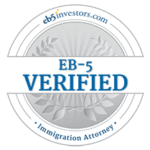David Hirson, founder of David Hirson & Partners, LLP, is an EB-5 investment immigration attorney with over 30 years experience practicing immigration law. His background includes managing immigration accounts for individual investors and numerous companies, providing companies with case processing, compliance, and start-up assistance, overseeing the immigration aspects of investments made by high profile individuals, and advising on/filing regional center and EB-5 investor applications. Attorney Hirson has been certified by the State Bar of California’s Board of Legal Specialization as a Specialist in Immigration and Nationality Law continuously for more than 20 years.
Attorney Hirson has handled EB-5 cases since the EB-5 visa program was established in 1990, making him one of the most experienced active EB-5 immigration attorneys in the nation. He was present in the U.S. Senate when the EB-5 legislation was originally proposed and debated. Attorney Hirson then subsequently prepared and then filed one of the first few EB-5 cases with the Immigration and Naturalization Service, which is now USCIS, and this EB-5 case received approval. In fact, Attorney Hirson has filed many of the EB-5 cases that were approved throughout the first 10 years of the EB-5 visa program. Prior to forming his own law firm, Attorney Hirson was a partner at Fragomen, where he lead the Irvine office’s EB-5 team and referred many of the firm’s EB-5 cases from offices across the country.
Attorney Hirson is extremely active in the immigration law community. His memberships include the immigration law sections of the Los Angeles County Bar Association and the Orange County Bar Association; the American Bar Association (ABA); the Law Association for Asia and the Pacific (LAWASIA); the American Immigration Lawyers Association (AILA); and he is on the policy committee of the regional center trade group Association to Invest in the USA (IIUSA). Attorney Hirson has also held many prestigious membership positions in the past. He was chair of the international law section of the State Bar of California, chair of the Investor Visa Committee of the American Immigration Lawyers Association, vice-chair of the INS Headquarters Liaison Committee, chapter chair of the Southern California Chapter of AILA and chairman of the Orange County Bar Association’s immigration law section. Attorney Hirson has served as an editorial board member and contributor to every issue of EB5 Investors Magazine, with his articles including, “How to Become a Regional Center” and “Direct Investment Private Equity Model.” He was also an editorial board member and co-author of The EB-5 Handbook, A Guide for Investors and Developers, published in 2014.
Attorney Hirson earned his law degree in 1967 from the University of Witwatersrand in Johannesburg, South Africa. He has been licensed to practice law in the state of California for over 32 years. He is also admitted to practice before the U.S. Supreme Court, U.S. Court of Appeal for the Ninth Circuit, and the U.S. District Court of Appeals for the Eastern, Central and Northern Districts of California. Attorney Hirson has been recognized for his achievements by many organizations, including Southern California Super Lawyers, International Who’s Who of Business Lawyers, and the American Jewish Committee. For nearly 20 years in a row he has been Martindale Hubbell AV Rated, and from 2006 to 2014 has been recognized as one of the Top 50 Attorneys in Orange County, Calif.
Answers to EB-5 45 Questions Answered
- What happens to my investment if an EB-5 direct business area becomes a TEA?
- What are advantages of the EB-5 regional center route other than a lower minimum investment?
- How can principals in a Chinese-U.S. joint venture use their project to become EB-5 investors?
- Can non-profit hospitals be funded through the EB-5 program?
- What determines where you can live with an EB-5 visa?
- How can multiple investors within a family apply for EB-5?
- Does the entire EB-5 investment amount have to be made before filing the I-526?
- When can I move to the United States in the EB-5 visa process?
- How can you prove source of funds for gifts in the EB-5 program?
- Do you have to live near the EB-5 Regional Center that you invest in?
- Do the funds for an EB-5 Visa have to be personally owned by the entrepreneur?
- Is there usually a return on EB-5 investments?
- What is the total cost of an EB-5 visa?
- Will my EB5 visa be rejected if a criminal case was filed against me?
- Do I have to be involved in the company that receives my EB-5 visa investment?
- Do EB-5 investors have to sustain their investments after they receive their green card?
- Does an EB-5 investor have to own the majority stake in the new commercial enterprise?
- Does the government provide financing options for EB-5 visa applicants?
- Can EB-5 applicants work for another company during their conditional residency?
- How many EB-5 visa applicants file as individual investors?
- Can part-time jobs count towards EB-5 visa job creation requirements?
- What is the difference between NOID and RFE in an EB-5 visa case?
- What is lawful source of funds for the EB-5 visa program?
- How can I tell whether or not a Regional Center is in a TEA?
- How do I know which EB-5 Regional Center I can invest in?
- Do some EB-5 Regional Centers allow investors to directly manage their own EB-5 investments?
- How long does it normally take the USCIS to approve an I-526 petition?
- What is the difference between loan and equity based EB-5 regional center projects?
- What percentage of EB-5 program participants are granted their visas?
- When will we know that the EB-5 immigrant investor pilot program is extended?
- What is an EB-5 migration agent?
- Can EB-5 immigrant investors be guaranteed a return on their investment?
- How much does it cost to establish an EB-5 regional center?
- Can people from any country get an EB-5 visa?
- How much investment money does it cost to get an EB-5 visa?
- Do you need a sponsor for an EB-5 visa?
- How can you qualify as an EB-5 investor?
- Which family members can qualify for an EB-5 immigrant investor visa?
- Can I bring my family to the United States if I get an EB-5 visa?
- How can I more easily move money from China for the EB-5 visa program?
- What kinds of businesses qualify for EB-5 visa investment?
- What are the EB-5 visa investment requirements?
Verified EB-5 Investors
As of June 13, 2012
- EB5Investors.com found no public criminal record on BeenVerified.com
- Active BAR member in good standing
What does it mean to be a VERIFIED member of EB5Investors.com?
EB5Investors.com verifies attorney members before placing them on our directory. Not all professionals pass the verification process, and we are not paid by members in any way for verified badges. The entire verification process is performed by EB5Investors.com staff members based in Irvine, California.
We perform a background check on the member by using BeenVerified.com’s online background check tool. The BeenVerified.com criminal background database is compiled by pulling together public records. Misconduct, such as a proven criminal record, disqualifies the applicant from obtaining a verified badge from EB5Investors.com. For attorneys that practice law in the United States, a staff member also checks to make sure the attorney is in good standing with the BAR of the state they represent to practice bar in.
The Verified Badge does not mean or represent that the attorney has experience or specializes in immigration law. Please consult the State Bar or other government based sites for more information on a particular attorney.
EB5 Investors Magazine and EB5investors.com Articles
-
Can I file my I-526 petition? Yes, the door is wide open!
RIA has left the EB-5 program in a state of flux that has remained ambiguous as to how investors, projects, and the attorneys handling their cases can move forward.
David Hirson
-
An Immigration Attorney’s Perspective: Why EB-5 Investors Cannot Just Buy a Green Card
Many people, including some legislators, have viewed EB-5 as a “cakewalk” with little scrutiny where wealthy investors simply queue up for a fast-track green card. Although this is far from true, their viewpoint is understandable if they have not experienced the process first-hand. Attorneys David Hirson and Winnie Ng walk through the entire investor scrutiny process for those of us who have not experienced this process for ourselves.

David Hirson
-
EB-3: Is it an alternative to EB-5?
How do the EB-3 visa and EB-5 visa compare?

David Hirson
-
EB-5 Source of Funds Strategy
Attorney David Hirson discusses strategies for accurately documenting source of funds.
David Hirson
-
The EB-5 Retrogression Roadblock: Confronting the Challenges of a Chinese Visa Backlog in 2015 and Beyond.
Attorneys David Hirson and Cletus Weber explain how the visa backlog problem will affect EB-5 stakeholders.

David Hirson
-
From the Desk of an EB-5 Lawyer
David Hirson reviews some of the issues pertaining to EB-5 throughout 2013.

David Hirson
-
Quick Service Restaurants and the Move to Regional Center Sponsorship
Learn how Regional Centers have become a more popular route for Quick Service Restaurant investments.
David Hirson
-
From the Desk of an EB-5 Lawyer
David Hirson's insights on developments in the EB-5 arena.

David Hirson




